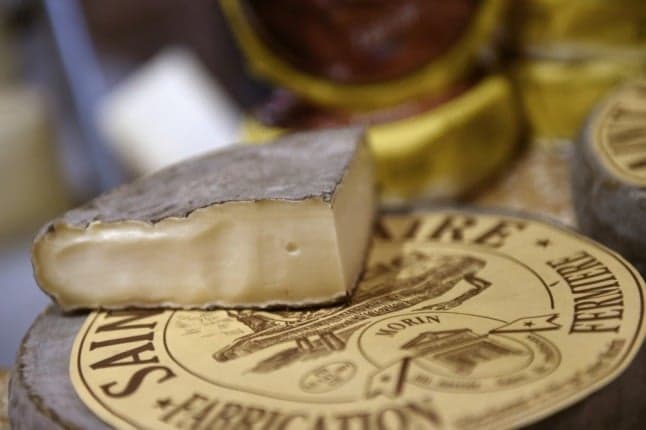France faces Christmas cheese shortage

Unseasonably grim weather over the summer has limited cheese production in France with a potentially disastrous effect for end-of-year festivities.
Heavy rains over the summer have lead to a particularly poor hay harvest, meaning that cows - who usually get extra nutrition from hay - have produced less milk than usual.
"So far, in terms of collected volume [of milk], we have seen a decrease of 15 to 20 percent," said Arnauld Dischamp, vice president of Dischamp cheese makers.
Dischamp is concerned over getting enough milk to make the cheese usually ordered in bulk for Christmas and New Year celebrations.
"All winter, we risk having a lack of volume and availability," he warned in an interview on BFMTV, saying that there could be "tensions on the availability" of cheese stocks due to high demand at end of year parties.
READ ALSO French summer was officially the coldest and dampest since 2014
Dischamps produces cheeses such as Saint-Nectaire, Cantal and Bleu d'Auvergne. Because these cheeses have protected geographical status, he is not able to make them from milk that comes from other, sunnier regions of France.
Following laws of supply and demand, it is likely that the price of cheeses will increase over the Christmas period.
This is not the first time France has faced a cheese shortage. Last year, there were fears over a raclette shortfall after demand soared during lockdown (a 20-25 percent increase over the course of the year).
READ ALSO
- The six best French winter dishes made with cheese
- Roquefort: The 600-year-old mouldy French cheese that heals wounds
- French cheese causes a stink at US customs
Ironically, the worldwide consumption of dairy products has helped lead to this crisis in the first place.
Cows produce a huge amount of methane, which is at least 84 times more powerful in terms of the greenhouse effect than CO2. At least 27 percent of methane emissions come from animal agriculture, with cows the most significant contributors.
Earlier this summer, French climatologist Françoise Vimeux explained to The Local that while it is difficult to attribute a singular weather event to climate change, periods of unseasonably intense rain are more likely.
“We know that heating up the atmosphere and the oceans exacerbates incidents of intense rain,” she said. "We know that when the atmosphere warms by one degree, it can hold 7 percent more water vapour. So when a weather event comes and cools down this air mass, there’s a lot more water which can fall.”
Bad weather over the summer has also threatened the annual lentil harvest, which was half the normal level in the Haute-Loire region this summer. In Alsace, honey production has fallen by 80 percent. Green bean, pea, carrot, cauliflower and brocoli harvests have also suffered.
Comments (1)
See Also
Heavy rains over the summer have lead to a particularly poor hay harvest, meaning that cows - who usually get extra nutrition from hay - have produced less milk than usual.
"So far, in terms of collected volume [of milk], we have seen a decrease of 15 to 20 percent," said Arnauld Dischamp, vice president of Dischamp cheese makers.
Dischamp is concerned over getting enough milk to make the cheese usually ordered in bulk for Christmas and New Year celebrations.
"All winter, we risk having a lack of volume and availability," he warned in an interview on BFMTV, saying that there could be "tensions on the availability" of cheese stocks due to high demand at end of year parties.
READ ALSO French summer was officially the coldest and dampest since 2014
Dischamps produces cheeses such as Saint-Nectaire, Cantal and Bleu d'Auvergne. Because these cheeses have protected geographical status, he is not able to make them from milk that comes from other, sunnier regions of France.
Following laws of supply and demand, it is likely that the price of cheeses will increase over the Christmas period.
This is not the first time France has faced a cheese shortage. Last year, there were fears over a raclette shortfall after demand soared during lockdown (a 20-25 percent increase over the course of the year).
READ ALSO
- The six best French winter dishes made with cheese
- Roquefort: The 600-year-old mouldy French cheese that heals wounds
- French cheese causes a stink at US customs
Ironically, the worldwide consumption of dairy products has helped lead to this crisis in the first place.
Cows produce a huge amount of methane, which is at least 84 times more powerful in terms of the greenhouse effect than CO2. At least 27 percent of methane emissions come from animal agriculture, with cows the most significant contributors.
Earlier this summer, French climatologist Françoise Vimeux explained to The Local that while it is difficult to attribute a singular weather event to climate change, periods of unseasonably intense rain are more likely.
“We know that heating up the atmosphere and the oceans exacerbates incidents of intense rain,” she said. "We know that when the atmosphere warms by one degree, it can hold 7 percent more water vapour. So when a weather event comes and cools down this air mass, there’s a lot more water which can fall.”
Bad weather over the summer has also threatened the annual lentil harvest, which was half the normal level in the Haute-Loire region this summer. In Alsace, honey production has fallen by 80 percent. Green bean, pea, carrot, cauliflower and brocoli harvests have also suffered.
Join the conversation in our comments section below. Share your own views and experience and if you have a question or suggestion for our journalists then email us at [email protected].
Please keep comments civil, constructive and on topic – and make sure to read our terms of use before getting involved.
Please log in here to leave a comment.